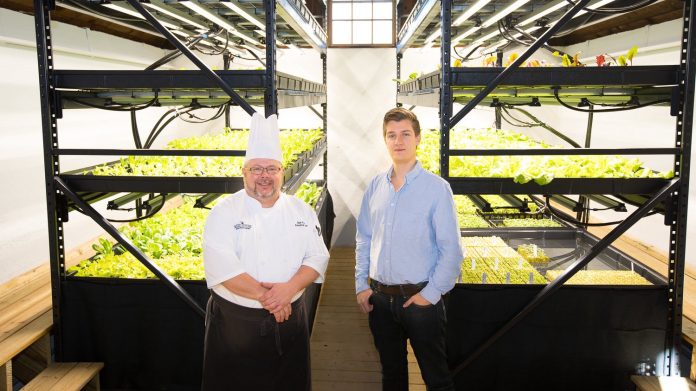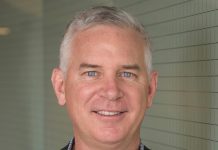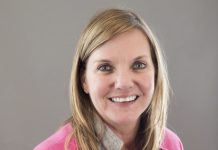Co-founder and CEO of Babylon Micro-Farms Alexander Olesen came up with the idea for the venture during his college years at the University of Virginia. He and Babylon co-founder Graham Smith got together for the company.
At the University of Virginia, Alexander Olesen and Graham Smith went to work designing a “low-cost micro-farm to provide nutritious produce for food-insecure refugees in the Middle East.”
Both Alexander Olesen and Smith got inspired by the “desire to bring benefits of sustainable hydroponic farming to those who need it the most.” The two men developed the technology “that would automate the complex aspects of indoor farming.”
With Babylon Micro-farms, Alexander Olesen has innovated indoor farming, and created a “transformative method of crop production” that is “accessible to anyone.”
Alexander Olesen and the Babylon team has “expanded this desire to bring hydroponic farming to not only include those in food insecure regions, but also those seeking sovereignty over their own food here at home.”
Currently, Alexander Olesen and Babylon are “leveraging their remote management technology to develop a complete indoor farming platform that will power a distributed network of Micro-Farms across North America.”
At Babylon Micro-farms, Alexander Olesen offers people “smart, scalable indoor farms tailored to meet the needs of healthcare and senior living.”
Check out more interviews with farming visionaries here.
Don’t be afraid to ask for things that seem crazy at the time, you never know where they will lead. Alexander Olesen, Babylon Micro-farms
Jerome Knyszewski: Thank you so much for joining us in this interview series! What is your “backstory”?
Alexander Olesen: I grew up on a farm in the UK and after moving to London I was shocked at the difference in the food. Everything was encased in plastic and there was no real sense of being connected to any of what you were buying and eating.
It was an eye-opening experience and stayed with me.
I moved to the US to study at the University of Virginia and enrolled in the Social Entrepreneurship where I met Graham Smith, my co-founder. It turned out to be the course that launched a thousand Micro-Farms.
The first prototype we built was designed to alleviate hunger in refugee camps in the Middle East.
Sadly, the bureaucratic reality of making that happen long distance while in school made it impossible to implement but we still believe that our tech will be able to provide fresh food to people who need it the most.
Jerome Knyszewski: Can you share the funniest or most interesting story that happened to you since you started your company? What lessons or takeaways did you take out of that story?
Alexander Olesen: Back in our early days we were a team of six and had a chance to demo our product at the local farmer’s market. The catch was that we had to be there at 5:30 am on a Saturday morning to set up.
It was a much smaller farm and simpler to transport and set up, but asking people that were already working at least 80 hours a week to get up at the crack of dawn and spend their day talking to the public was a bit of a stretch.
We were happily surprised by the response and had a great day out together and ended up selling a tabletop farm to our first customer who is still with us today.
That experience affirmed two things — we were creating something that people would want to buy and there was nothing our team was not up for.
It’s a long way from a chilly predawn parking lot to pitching in a boardroom to C-suite execs but the skills developed in talking to people about what you are passionate about never leave you, they just get better with experience.
Don’t be afraid to ask for things that seem crazy at the time, you never know where they will lead.
Jerome Knyszewski: Are you working on any exciting projects now?
Alexander Olesen: We absolutely are and plan to announce mid-2021, so stay tuned! So much has been happening lately I can share some recents wins — we partnered with Harvest Table, which is a company that is truly changing the way foodservice is being delivered at universities and colleges across the country.
They are a game-changer — their focus on fresh food and diverse menus is a night and day from standard cafeteria fare. As a recent graduate, I am just sorry they weren’t around when I was at university.
The best part is that the first farms were installed at UVa, which is where Graham and I founded Babylon as a project for a Social Entrepreneurship course.
Find those people that believe it is a) a great idea and b) that you are the person that can make it happen.
Jerome Knyszewski: Can you share 5 of the most difficult and most rewarding parts of being a “twentysomething founder”? Please share an example or story for each.
Alexander Olesen:
1) Being a young entrepreneur comes with many challenges, the most common being that people underestimate you based on your youthful appearance. My co-founder actually grew a beard to look older and it worked!
2) There are combined elements of being a tightrope walker and a workaholic that I have found necessary to found and manage a startup, which is essentially creating its own market niche.
Working 100 hours weeks is never fun but in your twenties, it is at least more practical than if you have a family or are working another full-time job.
Graham and I got very lucky when we met at UVa and realized that we were both willing to do whatever it took to make Babylon successful.
Looking back, we had absolutely NO idea what that was actually going to mean but we did it.
3) There is an overload of “greatest new ideas,” that are going to be game-changers, the internet is saturated with them. Hence the healthy scepticism and killer due diligence processes that many young founders of startups face.
Turn that concept around — do your research to find the best fit for your idea, not all investors are going to be suitable. Find those people that believe it is a) a great idea and b) that you are the person that can make it happen.
Many startups die unnecessary deaths not because the idea won’t work, but because the chemistry doesn’t. One of our early supporters — Plug and Play Ventures out of Silicon Valley — didn’t just recognize the viability of our short term strategy in vertical farming, they absolutely got our long term vision that we believe will be truly disruptive.
4) We love what we do. The most exciting part of what we do is continuing to build a team that gets it and is passionate about what we are doing.
For all the challenges, including getting drop-kicked into a virtual world due to COVID, I can’t imagine working a 40 hour week and not being the igniter of fires for our team members.
When they come to us and say “What about this?” and we say “YES!” is an experience for which there is no substitute. We also do have to say no, of course.
5) Explaining how our technology works and watching the people in a pitch — who are usually used to being the smartest people in the room and rightfully so — begin to understand not just the financial possibilities but what the truly valuable environmental impact is for what we are doing.
You can tell immediately who gets it, even over Zoom! Those moments make it easier to put yourself out there and the no’s you inevitably face fade a bit.
Having a thick skin is required when you are asking people to invest, don’t take it personally.
We want to be the first to farm in space. Alexander Olesen
Jerome Knyszewski: We are very blessed that some of the biggest names in Business, VC funding, Sports, and Entertainment read this column. Is there a person in the world, or in the US whom you would love to have a private breakfast or lunch with, and why? He or she might see this. 🙂
Alexander Olesen: Elon Musk. We want to be the first to farm in space and we have already thought through some of the challenges.
Jerome Knyszewski: What is the best way our readers can follow you on social media?
Alexander Olesen: LinkedIn is a great way to follow us, as is Instagram and we are on Facebook.
Jerome Knyszewski: This was very inspiring. Thank you so much for joining us!





